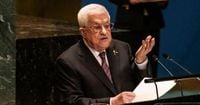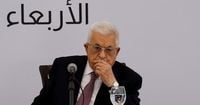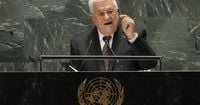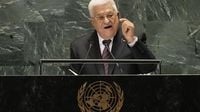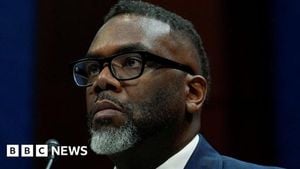In a move that has reverberated across diplomatic circles and sparked condemnation from international leaders, the United States has revoked the visa of Palestinian President Mahmoud Abbas, effectively barring him and 80 other Palestinian officials from attending the United Nations General Assembly in New York next month. The decision, announced by U.S. Secretary of State Marco Rubio on August 30, 2025, comes just weeks before Abbas was set to address the high-level annual meeting and participate in a pivotal conference on Palestinian statehood, co-hosted by France and Saudi Arabia.
The U.S. State Department cited national security interests as the rationale for the sweeping visa revocations, stating, "It is in our national security interests to hold the PLO (Palestine Liberation Organization) and PA (Palestinian Authority) accountable for not complying with their commitments, and for undermining the prospects for peace." The department further clarified that new visa applications from Palestinian officials, particularly those tied to the PLO, would also be denied, intensifying the diplomatic standoff.
Abbas, who has traditionally led the Palestinian delegation at the General Assembly and addressed the world body for years, now finds himself at the center of a controversy that threatens to escalate already heightened tensions in the Middle East. The Palestinian presidential office expressed "astonishment" at Washington’s decision. Nabil Abu Rudeineh, spokesperson for President Abbas, warned, "We call upon the American administration to reverse its decision. This decision will only increase tension and escalation." He added, "We have been in contact since yesterday with Arab and foreign countries, especially those directly concerned with this issue. This effort will continue around the clock."
The timing of the visa revocation is particularly significant. It comes as several countries prepare to formally recognize Palestinian statehood at the United Nations in September, a move seen by many as a critical step toward reviving the long-stalled two-state solution. The high-level conference on September 22, co-hosted by France and Saudi Arabia, was expected to provide a platform for renewed international engagement on the issue. The U.S. action, however, has cast a shadow over these efforts and drawn sharp rebukes from allies and adversaries alike.
The European Union was quick to voice its disapproval. EU foreign policy chief Kaja Kallas issued a statement urging Washington to reconsider, highlighting the "existing headquarters agreements between the UN and its host state." French Foreign Minister Jean-Noël Barrot was even more direct, stating, "The United Nations headquarters is a place of neutrality, a sanctuary dedicated to peace, where conflicts are resolved. The UN General Assembly cannot suffer any restrictions on access." Spanish Prime Minister Pedro Sanchez also weighed in after a conversation with Abbas, describing the visa denial as "unjust" and affirming, "Palestine has the right to make its voice heard at the United Nations and in all international forums."
Critics argue that the U.S. decision violates established diplomatic protocol and the 1947 UN "headquarters agreement," which obliges the United States, as host country, to allow access for foreign diplomats to the UN in New York. Matt Duss, executive vice president at the Center for International Policy, told Al Jazeera, "What’s going on here is clearly ideologically driven. There are people inside the Trump administration who are working closely with the right-wing Israeli government and their goal is to simply remove the Palestinian liberation movement from the international agenda."
Not all Palestinian officials were affected equally: Representatives assigned to the UN mission were granted exceptions from the visa revocation, allowing some Palestinian presence at the meetings. Nonetheless, the absence of Abbas, the most senior Palestinian leader, is widely seen as a blow to Palestinian diplomatic efforts and a setback for those seeking renewed dialogue at the international level.
The U.S. move comes against a backdrop of escalating violence in the region. The Israeli military recently declared Gaza City a combat zone amid ongoing conflict, with Israel maintaining that the city remains a stronghold of Hamas. The humanitarian situation in Gaza has deteriorated significantly, with international organizations warning of famine and widespread destruction of civilian infrastructure. The International Red Cross, for instance, has emphasized that Israel’s planned mass evacuation of Gaza City "could never be done in a way that is safe and dignified under the current conditions."
European leaders are divided on how to respond to Israel’s actions. While Denmark’s Foreign Minister Rasmussen has called for limited EU sanctions on Israel, including curbing trade and banning products from West Bank settlements, Germany has resisted such measures, instead opting to restrict weapons deliveries as a more targeted approach. EU foreign ministers, meeting in Copenhagen, have so far failed to reach consensus on sanctions, underscoring the bloc’s internal divisions on the issue.
The U.S. visa ban has also stirred memories of past confrontations over Palestinian representation at the UN. In 1988, the U.S. refused to issue a visa to PLO leader Yasser Arafat, forcing the General Assembly to relocate temporarily to Geneva so he could address the body. This historical parallel has not gone unnoticed among diplomats and observers, many of whom see the current episode as part of a broader pattern of American efforts to limit Palestinian participation on the world stage.
Meanwhile, pro-Palestinian sentiment is gaining visibility in other arenas. At the Venice Film Festival, thousands of activists gathered to protest Israel’s blockade of Gaza, calling on the entertainment industry to use its platform to spotlight the humanitarian crisis. An open letter condemning the Israeli government and urging the festival to take a stand has garnered over 2,000 signatures from film professionals, including prominent directors.
For now, the Palestinian Authority continues its diplomatic outreach, urging Arab and foreign governments to pressure Washington to reverse its decision. The United Nations, for its part, is seeking clarification from the U.S. State Department, with spokesperson Stephane Dujarric noting that the world body will discuss the issue further. The situation remains fluid, with the potential for further escalation as the General Assembly approaches and the international community grapples with the fallout from the U.S. move.
As the diplomatic standoff unfolds, the absence of Mahmoud Abbas from the UN stage sends a powerful message about the shifting dynamics of Middle East diplomacy and the enduring challenges facing those who seek a peaceful resolution to the Israeli-Palestinian conflict.
